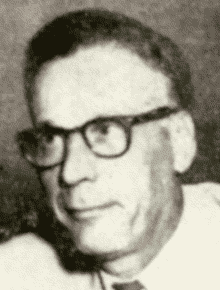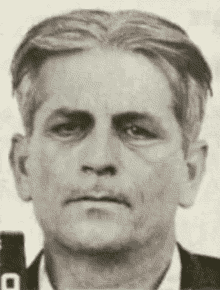

It appears that the Mafia of Dallas began as a sort of underworld colony of Corleone mafiosi who moved there from Louisiana. Mafiosi from the Pelican State are known to have established themselves in the Galveston-Houston area in the 1860s and can be found further inland in Bryan by around 1900. The Dallas crime family was probably established by 1910. It became influential in Oklahoma and Arkansas rackets and maintained close relationships with the crime families in New Orleans (plus the New Orleans Mafia satellite in Houston-Galveston) and Kansas City. The Dallas organization was unable or unwilling to protect its rackets territory against incursions from Chicago Outfit mobsters beginning in the 1940s. The crime family has appeared to be inactive since about the time of Joseph Civello's 1970 death.
1910 - Carlo T. Piranio (Born May 8, 1876, in Corleone, Sicily. Died Feb. 20, 1930, in Dallas.) Piranio - the name also has been written "Pirano" and "Praino" - was a native of Corleone, Sicily, and entered the U.S. about 1889, settling with his family in the Shreveport, Louisiana, area. He had connections with the underworld of New Orleans, including a family tie (through his mother Ursula Trombatore) to Mafia leader Leoluca Trombatore. Piranio's relocation to Texas occurred after the Shreveport birth of his first son in 1904 and before the date of the 1910 U.S. Census, which found the Piranio family residing at 774 Main Street in downtown Dallas. The family soon moved to 2531 Dawson Street. Piranio's reign is regarded as generally peaceful, though it featured some gangland murders connected with the Restivo-Campanella feud of 1918-1920 and the officially "accidental" 1928 fatal shooting of uncooperative bootlegger Joseph DeCarlo.
1919 - Carlo Piranio was arrested for receiving and concealing $2,500 worth of Liberty bonds stolen from a Dallas bank.
1930 - Piranio, a resident of 2810 Metropolitan Avenue, died at his home from a spinal cord cancer and related pressure in his skull. He was buried at Calvary Hill Cemetery in Dallas.
1930 - Joseph T. Piranio (Born Aug. 11, 1878, in Corleone, Sicily. Died Oct. 27, 1956, in Dallas.) Carlo Piranio was succeeded by his younger brother Joseph. Joseph Piranio followed his brother from Shreveport to Dallas before 1910 but seems also to have maintained a Louisiana residence for a time. He became a full-time Dallas resident around 1914, sharing a home on Exposition Avenue with his in-law Frank Aloi, a grocery merchant. Finding success as a building contractor and real estate investor, Piranio moved his family into a more comfortable home at 1247 South Ewing Avenue. One of his neighbors (and possibly a relative), Frank Ianni, served time for a 1926 narcotics conviction. Vincent Vallone, said by some to have been a Piranio in-law (and likely a Ianni in-law), became an important businessman and racketeer in the Houston area. Piranio was virtually unnoticed by the local press and largely unbothered by law enforcement, possibly due to his nephew's service in the local district attorney's office.
1945 - Chicago Outfit members and associates began to absorb coin-operated gambling rackets in Texas, Arkansas and the Shreveport area of Louisiana.
1949 - Vincent Vallone, powerful Calabrian underworld figure in Houston, was murdered. At the time, Harris County Sheriff C.V. Kern told the press he believed a vast Texas underworld network approved the murder. Kern, however, stated that Galveston resident and paroled murderer Peter Duca (convicted of two 1928 killings in Pittson, Pennsylvania) was both the organizer of the Vallone killing and boss of the Mafia in Texas. Federal authorities later decided that Duca was a soldier in the Piranio organization. Duca was returned to prison as a parole violator.
1956 - Joseph Piranio died about eight months after the death of his wife (Lena LaRocca Piranio, suffering with appendicitis and intestinal inflammation, died of cerebral thrombosis on Feb. 24, 1956). The Dallas Morning News reported that he died after a brief illness. The only "illness" noted on his death certificate was a gunshot wound in his right temple. The death was ruled a suicide.
The Piranios are discussed in the July 2010 issue of Informer.

Civello
1956 - Joseph Francis Civello (Born Feb. 3, 1903, in Lobdell, Louisiana. Died Jan. 17, 1970, in Dallas, Texas.) Piranio's successor, Joseph Civello, was born in Lobdell, a village northwest of Baton Rouge, Louisiana. When Civello was a youngster, his family relocated to the Dallas area, where his father Philip was a grocer and a Mafia soldier under the Piranios. The Civellos were relatives of the DeSimone clan of southern California. Joseph Civello was close to the Piranio family for years. The FBI noted that Civello served as a pallbearer at Joseph Piraino's funeral, and the Bureau called Civello a Piranio in-law. Civello reached the top spot in the Dallas Mafia at roughly the same time that his second-cousin Frank DeSimone became boss in Los Angeles.
Background: Civello was suspected of murder in the July 14, 1928, shooting death of Joseph DeCarlo, but he claimed the shotgun shooting was accidental and his story was accepted. Sources later indicated that DeCarlo's murder had been ordered by the Piranio leadership because DeCarlo was refusing to make required tribute payments from his rackets. Civello took charge of gambling operations - craps games, bookmaking and a horserace wire service - at the St. George Hotel in Dallas following the 1932 suicide of former rackets boss Warren Diamond. Civello's criminal record included convictions and jail terms for bootlegging and narcotics trafficking. He was imprisoned at Leavenworth Federal Penitentiary in spring of 1937 on the narcotics violation. (This occurred about half a year before federal agents uprooted an extensive Mafia drug trafficking operation.) During his imprisonment, his St. George Hotel ventures passed into the hands of Benjamin Binion, a former lieutenant of Warren Diamond (who earlier broke from Diamond to establish competing gaming rooms at the Southland Hotel). At the conclusion of the fifteen-year narcotics sentence, Civello became a major figure in the Piranio Mafia and established the Civello Import and Liquors business, 4236 Oak Lawn Avenue in Dallas, with brother Charles Civello and brother-in-law Rosario "Ross" Musso as his partners.
1957 - Shortly after becoming boss, Civello once again attracted law enforcement attention by participating in the November 1957 national Mafia convention at Apalachin, New York. There were reports that Civello represented both his own Dallas organization and the New Orleans Crime Family of Carlos Marcello at the Apalachin convention. Local and federal law enforcement noted Civello's connections to racketeers in other regions and made special note of his business relationships with Pete and Rocco Pellegrino of White Plains, New York. Civello and nineteen other Apalachin attendees were convicted of conspiracy to obstruct justice after they covered up the purpose of the convention. The conviction was later overturned.
1970 - Joseph Civello died at Baylor Hospital following a heart attack early in 1970.
Joseph Civello is discussed in the July 2010 issue of Informer.

Ianni
1970 - Following Civello's death, there was some speculation that he was succeeded as Mafia boss by one of two restaurateurs, Joseph "Little Joe" Ianni (b. Aug. 23, 1913; d. May 29, 1973) or Joseph Campisi (b. Oct. 11, 1917; d. Jan. 12, 1990). Ianni, a naturalized immigrant from Cannitello, Calabria, Italy, reportedly a relative of New York mobster Rocco Pellegrino, could not have served as boss for very long after Civello's death, as he passed away from a heart attack three years later. Campisi, a successful businessman and a Dallas native, repeatedly denied any role in organized crime. While both Campisi and Ianni had their tangles with law enforcement, the FBI did not find the rumors of their underworld command credible and concluded that the Dallas Crime Family quickly became inactive after Civello's death.